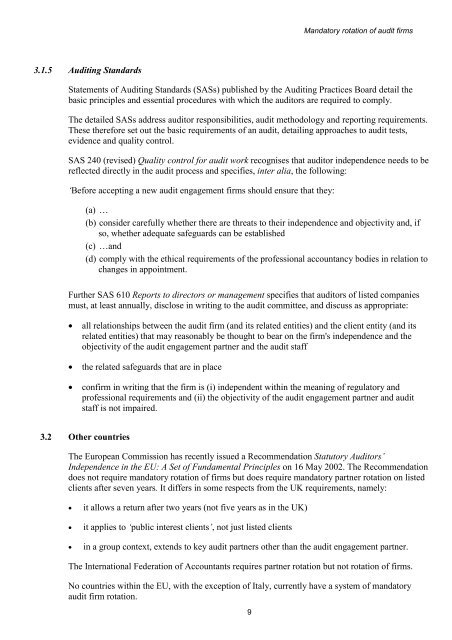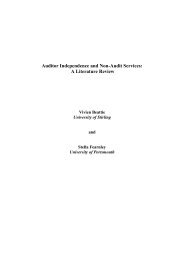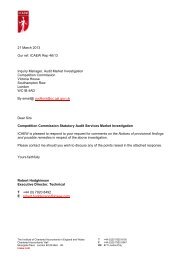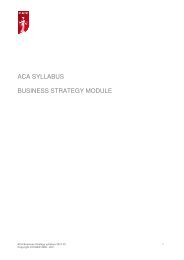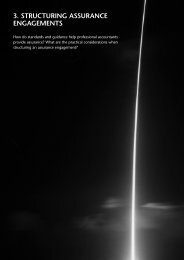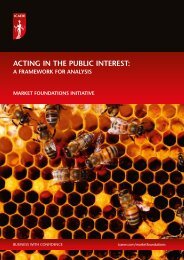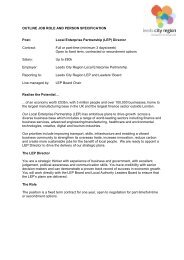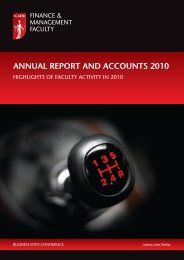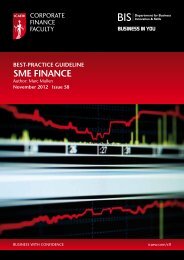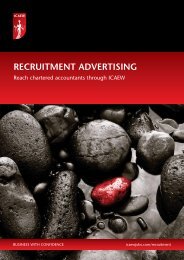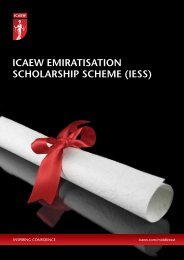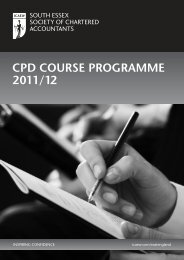Mandatory rotation of audit firms - ICAEW
Mandatory rotation of audit firms - ICAEW
Mandatory rotation of audit firms - ICAEW
You also want an ePaper? Increase the reach of your titles
YUMPU automatically turns print PDFs into web optimized ePapers that Google loves.
<strong>Mandatory</strong> <strong>rotation</strong> <strong>of</strong> <strong>audit</strong> <strong>firms</strong>3.1.5 Auditing StandardsStatements <strong>of</strong> Auditing Standards (SASs) published by the Auditing Practices Board detail thebasic principles and essential procedures with which the <strong>audit</strong>ors are required to comply.The detailed SASs address <strong>audit</strong>or responsibilities, <strong>audit</strong> methodology and reporting requirements.These therefore set out the basic requirements <strong>of</strong> an <strong>audit</strong>, detailing approaches to <strong>audit</strong> tests,evidence and quality control.SAS 240 (revised) Quality control for <strong>audit</strong> work recognises that <strong>audit</strong>or independence needs to bereflected directly in the <strong>audit</strong> process and specifies, inter alia, the following:‘Before accepting a new <strong>audit</strong> engagement <strong>firms</strong> should ensure that they:(a) …(b) consider carefully whether there are threats to their independence and objectivity and, ifso, whether adequate safeguards can be established(c) …and(d) comply with the ethical requirements <strong>of</strong> the pr<strong>of</strong>essional accountancy bodies in relation tochanges in appointment.Further SAS 610 Reports to directors or management specifies that <strong>audit</strong>ors <strong>of</strong> listed companiesmust, at least annually, disclose in writing to the <strong>audit</strong> committee, and discuss as appropriate:• all relationships between the <strong>audit</strong> firm (and its related entities) and the client entity (and itsrelated entities) that may reasonably be thought to bear on the firm's independence and theobjectivity <strong>of</strong> the <strong>audit</strong> engagement partner and the <strong>audit</strong> staff• the related safeguards that are in place• confirm in writing that the firm is (i) independent within the meaning <strong>of</strong> regulatory andpr<strong>of</strong>essional requirements and (ii) the objectivity <strong>of</strong> the <strong>audit</strong> engagement partner and <strong>audit</strong>staff is not impaired.3.2 Other countriesThe European Commission has recently issued a Recommendation Statutory Auditors’Independence in the EU: A Set <strong>of</strong> Fundamental Principles on 16 May 2002. The Recommendationdoes not require mandatory <strong>rotation</strong> <strong>of</strong> <strong>firms</strong> but does require mandatory partner <strong>rotation</strong> on listedclients after seven years. It differs in some respects from the UK requirements, namely:• it allows a return after two years (not five years as in the UK)• it applies to ‘public interest clients’, not just listed clients• in a group context, extends to key <strong>audit</strong> partners other than the <strong>audit</strong> engagement partner.The International Federation <strong>of</strong> Accountants requires partner <strong>rotation</strong> but not <strong>rotation</strong> <strong>of</strong> <strong>firms</strong>.No countries within the EU, with the exception <strong>of</strong> Italy, currently have a system <strong>of</strong> mandatory<strong>audit</strong> firm <strong>rotation</strong>.9


